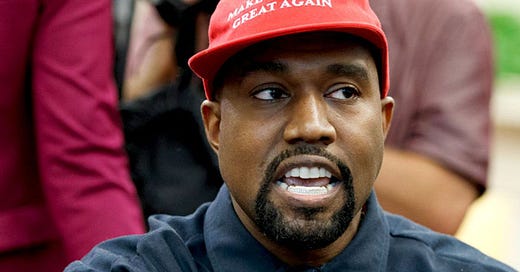Don't go West, young man
I didn't know "Kanye" was a boy's name till a week ago. Now I do. Oh, boy.
"I may disagree with what you say, but I shall defend to the death your right to say it." Voltaire. It's a "right" famously defended in London, at Hyde Park Corner, or "Speakers' Corner", where any member of the general public may set up an orange box and say whatever he, she or it wishes. And there are those who actually go there to listen to what people say. It's the same means by which royal edicts and proclamations were disseminated long ago, a man in a tricorn hat with a handbell to announce the shattering news (or Paul Revere, if you will). Then came the pamphlet, in the wake of the printing press. Polo and Columbus were much farther on toward their grave (Twelfth Night) than they'd now have been when reporting what they'd seen. I wonder if Voltaire would have been quite so understanding of that with which he did not agree if he'd known that not only he would be hearing it, but rather the whole world, and indeed then reacting upon it. Yet, my own awareness of this bloody war in Ukraine (Caravaggio), of the global climate breakdown, of the shenanigans around the world, caused in part by the world's own awareness of shenanigans elsewhere ("such a want-wit does it make of itself, that it has much ado to know itself" - Merchant of Venice) all stem from the same source as Mr West's disapprobation - the Net, in which we all, like Simon Peter's fishes, are caught (Gospels of Mark and Matthew - you've a choice, but at least it's attested). We, dear Stackers, are not fishers of men; we are fish.
So, a philosopher, explorers, the Bible and the Bard of Stratford aside, what help can science lend? Ah, Mr Newton: every action has an equal and opposite reaction. Now, that's all fine as far as apples go, but what about Internet "utterances"? An expression of hatred might be countered then by an expression of ... what? Well, so far, hatred against Mr West, so Newton's first law holds true there. What about incitement to hatred by Mr West, being reacted to by a punishment - prosecution under the 2009 Act that a Byrd and a Shepard had to die to bring into law (Elton John - American Triangle)? If Voltaire imagined that unsavoury opinions would only ever have an effect within earshot of the auditive hearer, should we then make people deaf so they cannot hear the unauthorised utterer, like banning pirate radio stations in the 70s (Radio Caroline)? Does the Internet cause more harm than it does good? Or did Berners-Lee imagine that, with a freeway of info accessible to all, we'd all trundle down it as law-abiding, respectable citizens, doffing our caps to those whom we chance upon along the way? If you regulate the Internet to that extent, you may as well just do away with it, like in North Korea.
Adolf Hitler - yes, him again - achieved his position as Chancellor by democratic means, whereupon his first act of policy was to abolish the democracy by which he'd got there - cutting the rope after he'd clambered aboard. He also said: "The force which ever set in motion the great historical avalanches of religious and political movements is the magic power of the spoken word."
Do we therefore assume that our status quo is so sacrosanct (please, don't tell me the status quo "in" bellum is sacrosanct) that we would repel all boarders from our ship of fools and cut the rope by which we clambered aboard; repel all invaders into our sanctity of clean and pure thought? How sure can we be that law aimed at preserving decency would not thereafter be usurped in order to preserve tyranny?
In this one thing Hitler was right - gosh, he is an archetype to rank alongside Machiavelli as an "Idiot's Guide to Ruling the World", we must wonder how could he have also been so wrong - aside from his thing about big lies being more believable than little ones: the spoken word is a force for change, be it for the better or the worse. And recognition of that truth must surely debouch into a mechanism designed to regulate its power. We regulate bombs and bullets, dangerous machinery and public acts, systems of government and pornographic magazines. And yet we do not regulate the most powerful force to have upheld tyranny ever?
Well, we do regulate it, but such a slippery entity as the spoken word is, we do so using malleable, shape-shifting concepts that result in endless trials, not to mention tribulations, and never really pin down what we meant by them when we inserted them into statute law: obscenity, hatred (there are those who love it, actually), incitement, outrage, dishonesty, fake, truth, evidence, proof, corroboration, denial. One man's decency is indeed another man's pissing.



